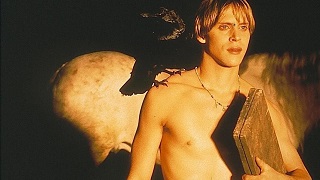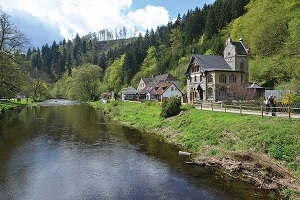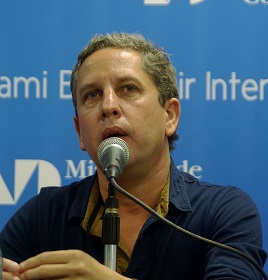De Nederlandse schrijver Harry Mulisch werd geboren op 29 juli 1927 in Haarlem. Zie ook alle tags voor Harry Mulisch op dit blog.
Uit: De ontdekking van de hemel
“Alleen al in ons eigen melkwegstelsel zijn er zo’n honderd miljard. Even veel als de mens hersencellen heeft.’ `Speak for yourself.’ `Verder zijn er ook rond honderd miljard extragalactische stelsels bekend, even veel als ik hersencellen heb, dus reken maar uit. Een één met tweeëntwintig nullen. Hoeveel talen zijn er?’ `Een schijntje. Rond tweeënvijftighonderd.’ ‘Kun je ook hiëroglyphen lezen?’ Wat voor hiëroglyphen?’ `Egyptische.’ `Niks aan. Spreken ook. Paut neteroe her resch sep sen ini Asar sa Heroe men ab maa kheroe sa Ast auau Asar. Hetwelk is, overgezet zijnde: «De paut van de goden verblijden zich over de komst van Osiris’ zoon Horus, opgericht in het hart, wiens woord absoluut is, zoon van Isis, erfgenaam van Osiris».’ ‘Toe maar. Wat betekent paut?’ ‘Ja, dat is nu even moeilijk, vervelend dat je dat vraagt. Volgens de meeste kenners slaat het op de oersubstantie, waarvan de goden zijn gemaakt; maar eigenlijk is het nog ingewikkelder, want in het Dodenboek zegt de scheppergod: «Ik bracht mijzelf voort uit de oersubstantie, die ik maakte». Maar laat ik je niet vermoeien met zulke archaïsche paradoxen.’ `Ze komen mij nogal modern voor,’ zei Max. ‘Waar woon je? Dan zet ik je voor de deur af.’ Beiden bleken in het centrum te wonen, niet ver van elkaar. Terwijl zij de stad in reden, vertelde Onno dat hij hiëroglyphen al kon lezen toen hij elf was. Dat had hij zichzelf bijgebracht met een oud engels leerboekje, voor een kwartje gekocht op de markt, zodat hij, met een woordenboek, tegelijk ook engels leerde. Dat was in de laatste oorlogswinter gebeurd, waarin, zei hij, honger en kou hem definitief hadden geknakt, — en meteen vroeg hij zich af, waarom hij zoiets vertelde aan een wildvreemde. Thuis, als jongen, sprak hij niet over zijn taalstudies. Hij dacht dat iedereen dat kon, die even de moeite nam. Zo was dat altijd met talent: een schrijver kon zich ook niet voorstellen, dat iemand niet kon schrijven. Dat het toch niet zo gewoon was, besefte hij pas na de oorlog, toen zij eens op vakantie waren in Finland. Zij zaten in hun hotel in Fbrneenlinna, daar ergens tussen die depressieve meren en naaldbossen, en de avond voor hun vertrek was het eten koud, of juist warm. Zijn vader riep de gerant, die vervolgens deed of hij de ober een uitbrander gaf; maar in werkelijkheid zei hij, dat hij zich maar niets moest aantrekken van die krenterige kaaskoppen, want morgen waren zij toch opgelazerd naar hun stompzinnige tulpen en windmolens.”

Harry Mulisch (29 juli 1927 – 30 oktober 2010)
Neil Newbon als de 18-jarige Quinten Quist in de verfilming uit 2001
De Koreaans-Amerikaanse schrijver Chang-Rae Lee werd geboren op 29 juli 1965 in Seoel. Zie ook alle tags voor Chang-Rae Lee op dit blog.
Uit: Native Speaker
“She was traveling heavy. This wasn’t a trip of escape, in that normal sense. She was taking with her what seemed to be hundreds of books and notepapers. Also pads, brushes, tiny pastel-tinted sponges. Too many hats, I thought, which she wore like some dead and famed flyer. A signal white scarf of silk. Nothing I had given her. And maps. Here was a woman of maps. She had dozens of them, in various scales. Topographic, touristical, some schematic—these last handmade. Through the nights she stood like a field general over the kitchen counter, hands perched on those jutting hip bones, smoking with agitation, assessing points of entry and encampment and escape. Her routes, stenciled in thick deep blue, embarked inward, toward an uncharted grave center. A messy bruise of ink. She had already marked out a score of crosses that seemed to say You Are Here. Then, there were indications she was misreading the actual size of the islands. Her lines would have her trek the same patches of rocky earth many times over. Overrunning the land. I thought I could see her kicking at the bleached, known stones; the hard southern light surrendering to her boyish straightness; those clear green eyes, leveling on the rim of the arched sea. Inside the international terminal I couldn’t help her. She took to bearing the heaviest of her bags. But at some point I panicked and embraced her clumsily. “Maybe I’ll come with you this time,” I said. She tried to smile. “You’re just trading islands,” I said, unhelpful as usual.
I asked if she had enough money. She said her savings would take care of her. I thought they were our savings, but the notion didn’t seem to matter at the moment. Her answer was also, of course, a means of renunciation, itself a denial of everything else I wasn’t offering. When they started the call for boarding she gave me the list, squeezing it tight between our hands. “This doesn’t mean what you’ll think,” she said, getting up. “That’s okay.” “You don’t even know what it is.” “It doesn’t matter.” She bit her lip. In a steely voice she told me to read it when I got back to the car. I put it away. I walked with her to the entrance. Her cheek stiffened when I leaned to kiss her. She walked backward for several steps, her movement inertial, tipsy, and then disappeared down the telescoping tunnel. I read through the list twice sitting in our car in the terminal garage. Later I would make three photocopies, one to reside permanently next to my body, in my wallet, as a kind of personal asterisk, I thought, in case of accidental death. Another I saved to show her again sometime, if I wanted pity or else needed some easy ammunition.“

Chang-Rae Lee (Seoel, 29 juli 1965)
De Duitse dichter en schrijver Thomas Rosenlöcher werd geboren op 29 juli 1947 in Dresden. Zie ook alle tags voor Thomas Rosenlöcher op dit blog.
Uit: Die Wiederentdeckung des Gehens beim Wandern. Harzreise
„Auch in den Auslagen herrschte das Signum der Sieger längst vor, und der Chrom ihrer Brotröstmaschinen leuchtete bis zum Ural. Nur hier und da hielt sich im Schaufenster noch ein sozialistischer Hilfspullover, oder eine Planerfüllungslampe brütete gebeugt vor sich hin. “Viel zu teuer”, sagte die Frau, die hier “viel zu teuer” sagte. Auch mir tat es weh, für ein Fünf-Pfennig-Brötchen aus den Zeiten des Zentralkomitees eine halbe Westmark hinlegen zu müssen. “Viel zu teuer”, sagte ein weißhaariger Greis angesichts der Selterswasserflaschen und hob seinen Stock drohend in Richtung Verkäuferin. “Wir machen doch nicht die Preise”, rief die Verkäuferin, und ihre Stimme klang ängstlich, da sich ihr, in Form meiner Person, ein bartverwildertes Wesen mit Rucksack näherte und jene eisenharte Semmel auf die Ladentheke knallte. (…) Das Zentrum der allgemeinen Aufregung war die Sparkassenschlange, die sich den Marktplatz entlang in Dreierreihen erstreckte: Schritt für Schritt, Bauch an Rücken, geschah der Übertritt in die neue Zeit auf die alte Weise: In einer Geschwindigkeit von 12½ Metern die Stunde. (…) Die Männer und Frauen aber, die wieder aus der Sparkasse traten, würdigten die Sparkassenschlange mit keinem Blick. Auf einmal ohne Vordermensch, mit luftigerem Gehensgefühl, zögerten sie kurz und gingen merkwürdig stromlinienförmig über die Gehwegplatten davon: als plötzliche Westgeldbesitzer ihre eigenen Westtanten und -onkel geworden. Nur einige ältere Leute blieben hier und da stehen und hielten ihren Kontoauszug verblüfft in Augenhöhe. (…) Immerhin war ein Teil des Ersparten in Westmark umgetauscht worden, aber der Rest der Jahre gnadenlos abgewertet. Selbst die Wäsche im Hof, wehend unter den vollen Segeln meiner Kindheitserinnerungen, trug auf einmal den Stempel SED-Regime.“

Thomas Rosenlöcher (Dresden, 29 juli 1947)
De Harz
De Argentijnse schrijver en wiskundige Guillermo Martínez werd geboren in Bahía Blanca op 29 juli 1962. Zie ook alle tags voor Guillermo Martinez op dit blog.
Uit: Vast Hell
“Often, when the grocery store is empty and all you can hear is the buzzing of flies, I think of that young man whose name we never knew and whom no one in town ever mentioned again. For some reason that I can’t explain, I always imagine him as we saw him that first time: the dusty clothes, the bristling beard, and especially the long, dishevelled hair that almost covered his eyes. It was the beginning of spring, which is why, when he came into the store, I took him for a camper headed south. He bought a few cans of food and some coffee; as I added up the bill, he looked at his reflection in the window, brushed his hair off his forehead, and asked me if there was a barber in town.
In those days, there were two barbers in Puente Viejo. Now I realize that if he’d gone to Old Melchor’s he might never have met the French Woman, and no one would have gossiped about them. But Melchor’s place was at the other end of town, and I had no reason to anticipate what happened.
The fact is that I sent him to Cerviño’s place, and it seems that while Cerviño was giving him a haircut the French Woman appeared. And the French Woman looked at the boy the way she looked at all men. And that was when the bloody business started, because the boy stayed on in town and we all thought the same thing: that he’d stayed on because of her.
It hadn’t been a year since Cerviño and his wife had settled in Puente Viejo, and we knew very little about them. They didn’t socialize with anyone, as the whole town used to point out angrily. If the truth be told, in poor Cerviño’s case it was little more than shyness, but the French Woman may, in fact, have been quite stuck up. They’d come from the big city the previous summer, at the beginning of the season, and when Cerviño opened his barbershop I remember thinking that he’d soon send Old Melchor under, because he had a hairdresser’s diploma and had won a prize in a crewcutting competition, and he owned a pair of electric clippers, a hair dryer, and a swivel chair, and he would sprinkle vegetable extracts onto your scalp and even spray some lotion on you if you didn’t stop him in time. Also, in Cerviño’s shop the latest sports magazine was always in the rack. And, above all, there was the French Woman. I never actually knew why people called her the French Woman, and I never tried to find out—I’d have been disappointed to discover that the French Woman was born, for instance, in Bahía Blanca, or, even worse, in a small town like this one. Whatever the truth, the fact is that I’d never met a woman quite like her. Maybe it was simply that she didn’t wear a bra: even in winter you could see that she wasn’t wearing a thing under her sweater.”

Guillermo Martínez (Bahía Blanca, 29 juli 1962)
Zie voor nog meer schrijvers van de 29e juli ook mijn blog van 29 juli 2017 deel 1 en ook deel 2.
